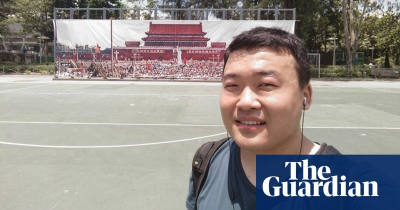The Guardian - China-Xi critic who fled on jetski to South Korea will die if sent back to China says father
November 22, 2023 5 min 924 words
这则报道揭示了中国异议者权平(Kwon Pyong)的惊险逃亡和在韩国面临的困境。权平因批评习近平而在中国被监禁,逃至韩国后可能面临严厉惩罚。这引发了对权平命运的担忧,尤其是韩国法庭可能为维护与北京关系而做出过于严厉的判决。报道中权平父亲的呼吁表达了对儿子生存权的渴望,同时也揭示了中国异议者在逃亡过程中所受到的压力和迫害。 这个故事突显了国际社会在人权和难民问题上的敏感性,以及各国在处理与中国关系时的复杂考虑。权平的逃亡既反映了对自由的追求,也揭示了中国对异议者的打压。韩国的难民政策和与中国的关系也成为舆论关注焦点。这个故事引发了对国际社会对中国政权的立场和对异议者的保护责任的思考。
The father of a Chinese dissident detained in South Korea said his son will die if he is sent back to China, a country he escaped from on a jetski in a life-threatening journey in August.
A court in South Korea will decide on Thursday the fate of Kwon Pyong, who is charged with violating the immigration control act. Kwon, 35, pleaded guilty and appealed for leniency as prosecutors requested a sentence of two and a half years, which experts say is unusually harsh.
In the first public comments by Kwon’s family, his father, Quan He, told the Guardian his son was “a young person and he desires freedom. I really hope that the Korean government can give him a way to live.”
Kwon has been held in Incheon detention centre since he washed up on the Korean coastline on the night of 16 August. As a dissident who had previously been jailed in China for criticising Xi Jinping, China’s leader, his case could strain the already fraught relations between Beijing and Seoul.
Kwon had jetskied for 16 hours across the 186 miles (300km) of treacherous waves between his official home and his ancestral one.
Kwon Pyong was born as Quan Ping to ethnically Korean parents in 1988 in Yanbian Korean Autonomous Prefecture, in China’s north-east Jilin province. As an adult, he preferred to use the Korean version of his name, Kwon, rather than the Chinese version used by his father, Quan.
Quan described his son as “an honest and sincere” person who had started publicly questioning the one-party rule of the Chinese Communist party after studying in the US.
Kwon studied aerospace engineering at Iowa State University, graduating in 2012. There, as well as learning about flight mechanics and wind propulsion, he marvelled on his personal blog at the democratic election of Barack Obama as president.
Upon his return to China, Kwon “had a lot of complaints about the Chinese system”, his father said. In October 2016, he had his first run-in with the authorities after posting a photograph of himself on X (then Twitter), wearing a T-shirt that said “#Xitler” and other derogatory names for Xi.
Kwon was imprisoned for “inciting subversion”, and after his release in 2018, the police followed him “everywhere”, his father said, making it difficult for him to work or rebuild his life.
He said his son was also placed under an exit ban: “He could not go abroad at all. He’d lived abroad before and wanted to return again to a country where there is more freedom.”
At a preliminary hearing last month, Kwon told the court: “I did not secretly enter Korea to destroy buildings or violate the law. After being sentenced in China, I lived without freedom and was unable to leave the country normally.”
Last year, Kwon managed to obtain a tourist visa for South Korea. As the exit ban meant he could not leave China through any of its airports, he decided to jetski.
The first Kwon’s family heard of his scheme was when a relative received a call from the Incheon coastguard on the evening of 16 August.
“Before [Kwon] started his journey, he did a lot of research on the internet,” said Quan, who has visited his son in prison. “In Europe, people can enter the country legally in this way. But when he tried to search if Korea is the same, he couldn’t find much information. He thought that because it is a democratic country, he would be accepted. He thought that if he was arrested he would just need to say, ‘I am a refugee’.”
South Korea is a party to the UN’s refugee convention but in the past 20 years it has accepted fewer than 4,000 asylum seekers, mostly from Yemen and Syria. Between 2017 and 2021, 5,225 Chinese nationals sought asylum in South Korea with just three accepted. “Korea is very reluctant about Chinese asylum seekers,” said Pillkyu Hwang, the director of the GongGam Human Rights Law Foundation in Seoul.
As well as South Korea’s restrictive refugee policies, there is pressure on the relationship between Seoul and Beijing, with concerns Kwon may be receiving unusually harsh treatment because of his status in China.
The two and a half year sentence was “unusually draconian”, said Christoph Bluth, a professor of international relations at the University of Bradford, an expert on Korean human rights. “Usually illegal immigrants are fined and deported.”
However, Bluth said this case was “politically sensitive … so the government will consider [the] impact on relations with China”.
Daeseon Lee, a South Korean human rights activist and friend of Kwon, said South Korea could face “international condemnation” if it “turns away political refugees from China due to its relationship with the Chinese government”.
The Chinese embassy in Seoul could not be reached for comment. South Korea’s justice department has been approached for comment.
It is not clear if, as well as a prison term in South Korea, Kwon could be sent back to China.
That is his worst nightmare, say his supporters. A relative who visited him daily said Kwon recently dreamed that he was caught by a Chinese boat at sea and arrested.
They said: “He risked his life to come to Korea. If Korea doesn’t want him that’s OK, a third country can take him, as long as he can live there well.”
His father added: “He would die if he went back [to China].”
Additional research by Chi Hui Lin

